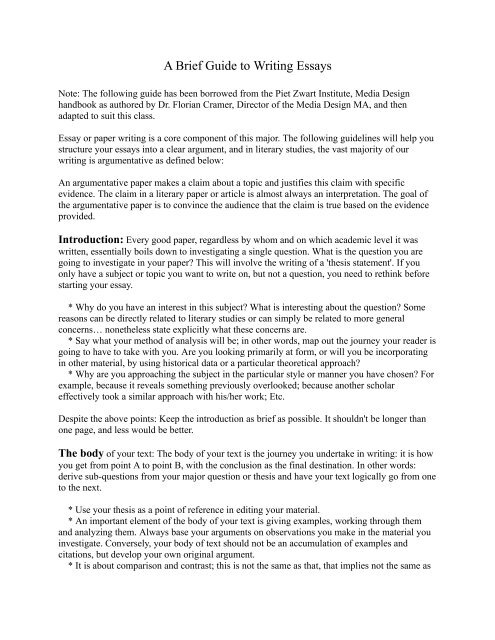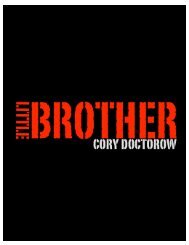A Brief Guide to Writing Essays - Kim De Vries
A Brief Guide to Writing Essays - Kim De Vries
A Brief Guide to Writing Essays - Kim De Vries
Create successful ePaper yourself
Turn your PDF publications into a flip-book with our unique Google optimized e-Paper software.
A <strong>Brief</strong> <strong>Guide</strong> <strong>to</strong> <strong>Writing</strong> <strong>Essays</strong><br />
Note: The following guide has been borrowed from the Piet Zwart Institute, Media <strong>De</strong>sign<br />
handbook as authored by Dr. Florian Cramer, Direc<strong>to</strong>r of the Media <strong>De</strong>sign MA, and then<br />
adapted <strong>to</strong> suit this class.<br />
Essay or paper writing is a core component of this major. The following guidelines will help you<br />
structure your essays in<strong>to</strong> a clear argument, and in literary studies, the vast majority of our<br />
writing is argumentative as defined below:<br />
An argumentative paper makes a claim about a <strong>to</strong>pic and justifies this claim with specific<br />
evidence. The claim in a literary paper or article is almost always an interpretation. The goal of<br />
the argumentative paper is <strong>to</strong> convince the audience that the claim is true based on the evidence<br />
provided.<br />
Introduction: Every good paper, regardless by whom and on which academic level it was<br />
written, essentially boils down <strong>to</strong> investigating a single question. What is the question you are<br />
going <strong>to</strong> investigate in your paper? This will involve the writing of a 'thesis statement'. If you<br />
only have a subject or <strong>to</strong>pic you want <strong>to</strong> write on, but not a question, you need <strong>to</strong> rethink before<br />
starting your essay.<br />
* Why do you have an interest in this subject? What is interesting about the question? Some<br />
reasons can be directly related <strong>to</strong> literary studies or can simply be related <strong>to</strong> more general<br />
concerns… nonetheless state explicitly what these concerns are.<br />
* Say what your method of analysis will be; in other words, map out the journey your reader is<br />
going <strong>to</strong> have <strong>to</strong> take with you. Are you looking primarily at form, or will you be incorporating<br />
in other material, by using his<strong>to</strong>rical data or a particular theoretical approach?<br />
* Why are you approaching the subject in the particular style or manner you have chosen? For<br />
example, because it reveals something previously overlooked; because another scholar<br />
effectively <strong>to</strong>ok a similar approach with his/her work; Etc.<br />
<strong>De</strong>spite the above points: Keep the introduction as brief as possible. It shouldn't be longer than<br />
one page, and less would be better.<br />
The body of your text: The body of your text is the journey you undertake in writing: it is how<br />
you get from point A <strong>to</strong> point B, with the conclusion as the final destination. In other words:<br />
derive sub-questions from your major question or thesis and have your text logically go from one<br />
<strong>to</strong> the next.<br />
* Use your thesis as a point of reference in editing your material.<br />
* An important element of the body of your text is giving examples, working through them<br />
and analyzing them. Always base your arguments on observations you make in the material you<br />
investigate. Conversely, your body of text should not be an accumulation of examples and<br />
citations, but develop your own original argument.<br />
* It is about comparison and contrast; this is not the same as that, that implies not the same as
this… Make clever juxtapositions that give nuance <strong>to</strong> your argument.<br />
* <strong>De</strong>scriptions are useful but don't overdo the detailing:<br />
<strong>De</strong>tails are important when they give evidence relevant <strong>to</strong> the claim you make in your thesis. Too<br />
many details however can be fatally distracting from your main point. Use them <strong>to</strong> enhance, not<br />
derail your argument or research. Some details may actually be de<strong>to</strong>urs which unnecessarily<br />
complicate or obscure your argument; if you really need <strong>to</strong> go off track, put this information in a<br />
footnote as a 'by the way did you know…'. In placing it there you don't destroy the flow of your<br />
main text.<br />
Conclusion:<br />
* A conclusion is intended <strong>to</strong> recapitulate all of the information you have gone through in the<br />
paper. Conclusions answer, in a more general way, the ideas or questions raised in the<br />
introduction. At this point you should be asking yourself: Did I answer the questions I sought <strong>to</strong><br />
explore in my thesis statement? Was I successful in going through examples <strong>to</strong> prove my point?<br />
* A conclusion can never introduce <strong>to</strong>tally new concepts as part of its argument. That would<br />
mean that you haven't done your homework in the main text. Introducing a <strong>to</strong>tally new concept<br />
as part of your conclusion is like telling someone that you are driving them <strong>to</strong> the cinema (thesis<br />
statement) and when you arrive you don't let them out of the car but instead you drive off <strong>to</strong> a<br />
vacant lot. Needless <strong>to</strong> say that as a passenger this can be pretty irritating. Readers are also not<br />
very keen on this type of journey.<br />
That does not mean that your conclusion might not raise particular questions, which are crucial<br />
<strong>to</strong> your conclusion. For example:<br />
"In seeing how the use of X image shifts over the course of the poem/novel/text, we must ask<br />
whether this instability signals only a personal transition for the protagonist (or author) or is<br />
meant <strong>to</strong> draw our attention <strong>to</strong> a larger public issue."<br />
Or: "In analysing these mechanisms at work we must ask the following: Who or what is being<br />
defined and by whom for what purposes?"<br />
Do your conclusions have any relevance <strong>to</strong> you or anyone else? They should and you should say<br />
why. You should expand on the effect or implication of your ideas. This is the real point of the<br />
paper, and it should not be missed!<br />
No paper, not even a 1000-page book, will ever answer all questions about its central question.<br />
You will have <strong>to</strong> live with incompletion. Sometimes, it can be useful though <strong>to</strong> point <strong>to</strong> open<br />
questions or issues, in other words, left-overs from your thought process that didn't fit in<strong>to</strong> the<br />
essay proper. Phrase these points, if you like, as open questions and potential directions of future<br />
research as an addendum <strong>to</strong> your conclusion.<br />
referencing: Give credit where credit is due! Never borrow thoughts, quotes, or even paraphrase<br />
without properly crediting the original source. This is done through footnotes and through a list<br />
of references at the end of your paper. Accurate, clear referencing offers the reader the
opportunity <strong>to</strong> engage in the process of your research, and <strong>to</strong> understand how your arguments<br />
and ideas have been initiated and developed. Other people may use your paper as a resource <strong>to</strong><br />
learn more about its <strong>to</strong>pic and pick up related literature from your references. It is also, of course,<br />
essential that you distinguish between your own ideas and arguments, and those of other people;<br />
the more clear you are, the better you can shape your own ideas.<br />
Conversely, citations do not replace your own thoughts and ideas. Never use sources as<br />
unquestioned authorities. The fact that a certain opinion was voiced by a well-known scholar,<br />
artist or intellectual doesn't make it true. Theories are there <strong>to</strong> show you things in a different<br />
light, but never <strong>to</strong> replace your own ideas and opinions.<br />
Plagiarism: Not properly referencing your sources is plagiarism. Plagiarism means <strong>to</strong> present<br />
work done by others as your own. While plagiarism has sometimes been tactically advocated and<br />
used <strong>to</strong> question ideologies of intellectual property, and is not defined as a problem in some<br />
rhe<strong>to</strong>rical or literary traditions, not crediting your sources is unacceptable in course work because<br />
it is dishonest <strong>to</strong> your teachers and fellow students. Plagiarism invalidates your essay and may<br />
result in further disciplinary procedure, including possible expulsion from the course, program<br />
and even the university.<br />
lay out for quotations: Short quotations can be written as part of the flow of the sentence, with<br />
quotation marks. Longer quotations (four or more lines) should be separated from the main body<br />
of the text by means of indention. In this case quotation marks are not needed. For example:<br />
I agree with Hal Foster when he says:<br />
I supported a postmodernism that contested […] reactionary cultural<br />
politics and advocated artistic practices not only critical of institutional<br />
modernism but suggestive of alternative forms of new ways <strong>to</strong> practice<br />
culture and politics. And we did not lose. In a sense the worse thing<br />
happened: treated as fashion postmodernism became démodé. (Foster,<br />
1998, p.20)<br />
Going further from this point, I would suggest that theory, a key feature of the<br />
postmodern enterprise, became démodé only after becoming convention…<br />
- Be careful not use <strong>to</strong>o many block quotations in your paper. Your should never write a text<br />
which just consists of short remarks between block quotations! At the same time, especially for a<br />
formal analysis, be sure <strong>to</strong> quote long enough passages that readers whom do not have the<br />
original text in front of them can still understand the passage you discuss.<br />
These guidelines are deliberately quite general <strong>to</strong> avoid restricting your thoughts or needs as a<br />
writer. If you have further questions, such as whether your argument makes sense, whether your<br />
organization is effective, or other concerns specific <strong>to</strong> your paper, post your text <strong>to</strong> the forum and<br />
ask for feedback.



